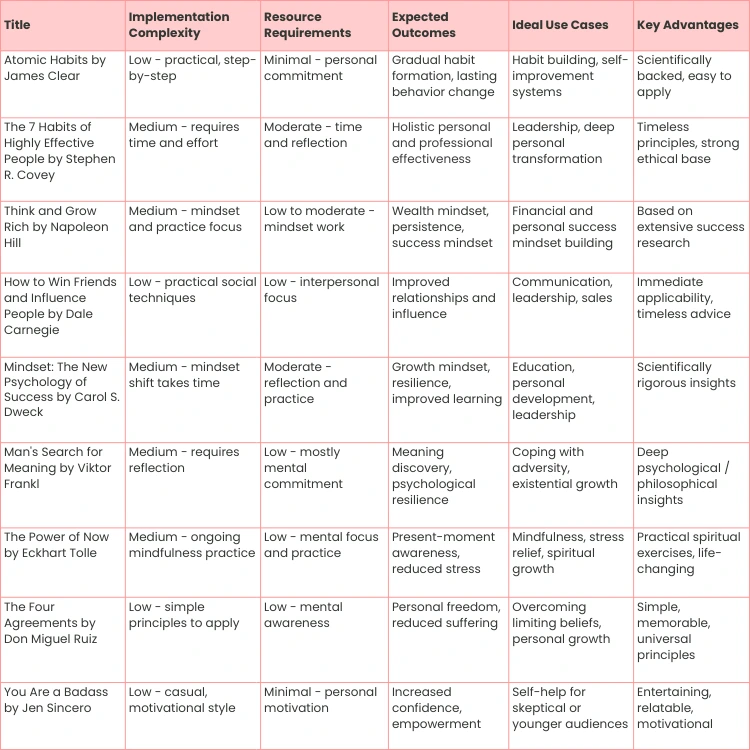9 Best Self Improvement Books to Read in 2025

Are you ready to unlock your full potential but aren't sure where to begin? The journey to a better you often starts with a single, powerful idea. This curated list of the best self improvement books offers more than just inspiration; it provides practical, actionable frameworks to fundamentally change your habits, mindset, and relationships. We've distilled each classic, focusing on the core principles and showing you exactly how to apply them to see tangible results in your life.
As you embark on this journey, making the most of every book means employing effective strategies to better retain information so these lessons truly stick. Whether you're aiming to build disciplined habits, cultivate a growth mindset, or master your interpersonal skills, this guide will help you choose the right book to catalyze your transformation. Let's turn the page on your personal growth journey.
Jump To Section

Earn As You Learn
Earn 25% commission when your network purchase Uplyrn courses or subscribe to our annual membership. It’s the best thing ever. Next to learning,
of course.
1. Atomic Habits by James Clear
Atomic Habits by James Clear is a cornerstone in the world of the best self improvement books, offering a practical and effective framework for personal change. It argues that massive success doesn't come from a single monumental action, but from the compound effect of tiny, consistent behaviors. For example, improving by just 1% each day results in being 37 times better by the end of the year. Clear’s central thesis is that focusing on systems, not just goals, is the key to lasting improvement.
The book introduces the Four Laws of Behavior Change: Make it Obvious, Attractive, Easy, and Satisfying. For a deeper dive into practical application, explore James Clear's strategies for mastering habits to complement the insights from 'Atomic Habits'.
How to Implement Atomic Habits
- Start Small: Begin with a "two-minute rule." Want to read more? Start by reading one page per night. The actionable insight here is to make starting so easy you can't say no.
- Habit Stacking: Anchor a new habit to an existing one. A practical example: "After I pour my morning coffee (existing habit), I will meditate for one minute (new habit)."
- Design Your Environment: Make good habits the path of least resistance. To encourage a morning run, place your workout clothes and running shoes by your bed the night before.
- Focus on Identity: Shift your mindset from "I want to run" to "I am a runner." This reinforces your commitment on a deeper level. An actionable insight is to ask yourself, "What would a healthy person do?" before making a choice.

2. The 7 Habits of Highly Effective People by Stephen R. Covey
Stephen R. Covey's The 7 Habits of Highly Effective People is a landmark contribution to the library of best self improvement books, providing a principle-centered framework for personal and professional effectiveness. It guides readers on a maturity continuum from dependence to independence and finally to interdependence. Covey’s core message is that true success comes from aligning our lives with timeless principles of fairness, integrity, and human dignity.
The book outlines seven habits that build a foundation for character and competence. These principles are not quick fixes but a holistic approach to life. Many of the habits are foundational for personal growth and for anyone looking to learn more about how to build leadership skills.
How to Implement The 7 Habits
- Be Proactive: Focus on what you can control. For example, instead of complaining about a difficult project at work (reactive), schedule a meeting to clarify expectations and offer solutions (proactive). Use proactive language like "I will" instead of "I can't."
- Begin with the End in Mind: Define your personal mission and values. An actionable insight is to take 30 minutes to write a personal mission statement that outlines your core values and long-term goals. This will guide your daily decisions.
- Put First Things First: Prioritize your tasks based on importance, not just urgency. Use a planner to schedule "Quadrant II" activities—important but not urgent tasks like planning, relationship building, and exercise—before your week begins.
- Seek First to Understand, Then to Be Understood: Practice empathic listening. In a disagreement with a partner, instead of preparing your rebuttal, repeat their point back to them ("So what I hear you saying is...") to ensure you understand their perspective before sharing your own.
3. Think and Grow Rich by Napoleon Hill
Think and Grow Rich by Napoleon Hill is a foundational text in the library of the best self improvement books, built on the study of over 500 self-made millionaires. Its core philosophy asserts that a burning desire, combined with faith and persistence, is the true starting point of all achievement. Hill argues that our thoughts directly shape our reality, and mastering them is the key to accumulating wealth and success.
The book outlines 13 principles for success, from developing specialized knowledge to the power of the "Master Mind" alliance. These timeless concepts require a disciplined mindset; you can learn more about how to improve critical thinking to help apply Hill's principles effectively.
How to Implement Think and Grow Rich
- Define Your Purpose: Write down a clear, concise statement of your major definite purpose. For example: "By January 1st, 2026, I will have $10,000 in my savings account, which I will earn by providing freelance graphic design services."
- Form a Mastermind Group: Surround yourself with a small group of like-minded individuals. A practical example is to create a weekly call with two other aspiring entrepreneurs to discuss challenges and share solutions. Andrew Carnegie attributed his fortune to his mastermind group.
- Practice Auto-Suggestion: Read your written purpose statement aloud twice daily. An actionable insight is to set a recurring alarm for morning and night. As you read, visualize yourself already having achieved your goal to influence your subconscious mind.
- Develop Persistence: Treat failure as a temporary setback. A practical example from the book is Henry Ford, who faced multiple business failures before the Ford Motor Company found massive success. The actionable insight is to analyze what went wrong, learn from it, and try a new approach.
4. How to Win Friends and Influence People by Dale Carnegie
How to Win Friends and Influence People by Dale Carnegie is a foundational text and one of the best self improvement books for mastering interpersonal skills. Its enduring principles focus on the power of genuine interest, empathy, and making others feel valued. Carnegie’s core philosophy is that you can change other people’s behavior by changing your own, shifting interactions from conflict to cooperation.
The book is filled with anecdotes, like how Abraham Lincoln learned to avoid criticizing others, which transformed his leadership. These principles are not about manipulation but about building authentic connections. For a modern take on professional interaction, explore these business body language tips to complement Carnegie's timeless advice.
How to Implement Carnegie's Principles
- Show Genuine Interest: Instead of just asking "How are you?", ask a specific, thoughtful question about something you know is important to them, like, "How did your daughter's piano recital go last weekend?"
- Use Their Name: An actionable insight is to repeat a person's name once when you meet them and once again during the conversation. This simple act makes them feel recognized and important.
- Be a Good Listener: Encourage others to talk about themselves. In your next conversation, make it a goal to listen 75% of the time and talk only 25%. This will help you fully understand their perspective.
- Admit Your Mistakes: When you make a mistake at work, an actionable tip is to immediately go to your manager and say, "I made an error on that report. I've already identified the issue and here's my plan to fix it." This approach disarms others and fosters trust.

5. Mindset: The New Psychology of Success by Carol S. Dweck
Mindset: The New Psychology of Success by Carol S. Dweck is a transformative entry among the best self improvement books, built on a simple yet powerful idea: our beliefs about our abilities dictate our success. Dweck introduces the "fixed mindset," the belief that talent is static, and the "growth mindset," the belief that abilities can be developed through dedication and hard work. This distinction explains why some people thrive on challenges while others avoid them.
The book’s core message is that embracing a growth mindset fosters resilience and motivation. A practical example is a student who fails a test. With a fixed mindset, they think "I'm bad at math." With a growth mindset, they think "I need to study differently for the next one."
How to Implement a Growth Mindset
- Embrace "Yet": Reframe your internal dialogue. Instead of thinking "I can't do this," an actionable insight is to consciously add the word "yet" at the end: "I can't do this yet." This small change opens the door to future possibility.
- Focus on Process: Praise the effort and strategies used, not just the result. For example, instead of telling a child "You're so smart," say "I'm impressed by how you kept trying different strategies to solve that problem."
- View Challenges as Opportunities: See difficult tasks not as threats, but as chances to learn. When your boss assigns a project outside your comfort zone, your actionable response should be to identify the specific skills you'll develop by completing it.
- Learn from Criticism: Treat feedback as valuable information. A practical example: after a presentation, ask a trusted colleague, "What is one thing I could do to improve for next time?" rather than just asking "How did I do?"

6. Man's Search for Meaning by Viktor E. Frankl
Man's Search for Meaning is a profound and transformative work that earns its place among the best self improvement books by exploring the power of purpose in the face of unimaginable suffering. Authored by psychiatrist and Holocaust survivor Viktor Frankl, the book introduces logotherapy, which posits that our primary drive is the pursuit of what we find meaningful.
Frankl's core message is that while we cannot always control our external circumstances, we can always control our internal response. This freedom to choose our attitude provides the ultimate path to finding meaning. His own survival was fueled by his love for his wife and his desire to finish his scientific work—a powerful practical example of a "why" that can help anyone endure almost any "how."
How to Implement Man's Search for Meaning
- Identify Your Purpose: Actively reflect on what gives your life meaning. An actionable insight is to dedicate 15 minutes to journaling about a time you felt truly fulfilled and analyze what elements were present (e.g., helping others, creating something).
- Focus on Your Freedom to Choose: In a stressful situation like a traffic jam, you cannot control the traffic, but you can control your response. A practical choice is to use the time to listen to an educational podcast instead of getting angry.
- Practice Self-Transcendence: Find meaning by focusing on something outside yourself. A simple example is volunteering at a local food bank for a few hours a month or mentoring a junior colleague at work.
- Find Meaning in Suffering: When facing a challenge you cannot change, like a chronic illness, reframe it as an opportunity to demonstrate courage or inspire others. An actionable insight is to ask, "How can this experience help me grow or help others?"
7. The Power of Now by Eckhart Tolle
The Power of Now by Eckhart Tolle is a transformative guide that has earned its place among the best self improvement books by shifting focus from future goals to present-moment awareness. Tolle's core message is that the root of human suffering is the mind's attachment to past regrets and future anxieties. By learning to live in the "Now," we can find inner peace and clarity.
The book teaches readers to dis-identify from their thoughts—the "voice in the head." By becoming the observer of your mind, you can tap into a deeper sense of self. This practice is incredibly effective; learning how to manage stress at work becomes much simpler when you can anchor yourself in the present moment.
How to Implement The Power of Now
- Observe Your Thoughts: An actionable insight is to set a timer for two minutes and simply watch your thoughts without getting involved. Notice them as if they are clouds passing in the sky.
- Focus on Breath: When you feel overwhelmed with anxiety about a future event, a practical step is to pause and take three deep breaths. Focus entirely on the sensation of air entering and leaving your body.
- Use Waiting as an Opportunity: Instead of getting impatient while in a queue, use that time to feel the aliveness in your hands or feet. This is a practical way to practice presence in daily life.
- Engage Senses Fully: When you drink your morning coffee, don't scroll on your phone. Instead, fully experience the aroma, the warmth of the mug, and the taste. This grounds you in the present moment.

8. The Four Agreements by Don Miguel Ruiz
The Four Agreements by Don Miguel Ruiz is a profound guide to personal freedom and one of the best self improvement books for transforming your mindset. Drawing on ancient Toltec wisdom, the book reveals how societal "domestication" creates self-limiting beliefs. It proposes a powerful code of conduct to break these patterns and achieve a life of peace and fulfillment.
The core of the book is four simple yet impactful agreements: Be Impeccable With Your Word, Don’t Take Anything Personally, Don’t Make Assumptions, and Always Do Your Best. Adopting these principles helps you stop judging yourself and others, communicate clearly, and live with integrity.
How to Implement The Four Agreements
- Be Impeccable With Your Word: Speak with integrity. A practical example is choosing to provide honest, constructive feedback to a colleague instead of complaining about them to others. The actionable insight is to think before you speak and ask if your words are true and kind.
- Don't Take Anything Personally: Realize that what others say is a projection of their own reality. If a colleague is critical of your work, the actionable insight is to listen for any valid feedback but separate it from their emotional delivery, which may be about their own stress.
- Don't Make Assumptions: Find the courage to ask questions. In a relationship, instead of assuming why someone is upset, a practical step is to ask directly: "I noticed you seem quiet. Is everything okay?"
- Always Do Your Best: Your best changes from moment to moment. If you're tired or sick, your best will be different than when you are well-rested. The actionable insight is to simply do what you can with the energy you have, which prevents self-judgment and regret.
9. You Are a Badass by Jen Sincero
You Are a Badass by Jen Sincero is a refreshing and humorous addition to the list of best self improvement books, perfect for those who find traditional self-help guides a bit dry. Sincero blends laugh-out-loud anecdotes, spiritual concepts, and no-nonsense advice to help you dismantle self-sabotaging beliefs. The book’s core message is that you have the power to create a life you love, and it starts with believing you are worthy of it.
Sincero's approach is about taking decisive action. For those looking to build on this foundation, you can learn more about unlocking unlimited self-esteem with targeted strategies that complement the book's teachings.
How to Implement "You Are a Badass"
- Identify Limiting Beliefs: A practical exercise from the book is to fold a piece of paper in half. On one side, write down every negative belief you have (e.g., "I'm not qualified for a better job"). On the other, write an empowering counter-statement ("I have valuable skills and am capable of learning what's needed").
- Practice Gratitude: Start a daily gratitude journal. An actionable insight is to list three specific things you're grateful for each night before bed, like "the helpful conversation I had with a coworker." This shifts your energy from lack to abundance.
- Take Imperfect Action: Don't wait until you feel 100% ready. If you want to start a blog, a practical first step is to simply write one 300-word post today and publish it, even if it's not perfect.
- Raise Your Vibration: Surround yourself with people who uplift you. A concrete action is to make a decision to spend less time with a friend who constantly complains and schedule a coffee with someone who inspires you.

From Reading to Doing: Your Action Plan for Growth
You’ve just explored a curated library of the best self improvement books ever written, each a potential catalyst for profound change. From James Clear’s practical framework for building 1% daily improvements with Atomic Habits to Dale Carnegie’s timeless strategies for fostering genuine connections in How to Win Friends and Influence People, the wisdom is now in your hands. We've seen how a growth mindset, as detailed by Carol Dweck, can redefine your potential, and how Viktor Frankl’s search for meaning can anchor you through life’s greatest challenges.
The common thread weaving through these masterpieces is simple: knowledge is useless without action. True transformation doesn’t happen when you turn the final page; it begins when you implement the first small change. Reading about Covey's "Begin with the End in Mind" is insightful, but actually writing a personal mission statement is what creates direction. Understanding The Four Agreements is one thing, but consciously choosing to be impeccable with your word tomorrow at work is where growth occurs.
Your Immediate Action Plan
To bridge the gap between reading and doing, commit to a tangible next step today. Don't let this newfound motivation fade.
- Select One Book: Choose the single title from this list that speaks directly to your most pressing goal right now. Is it building better habits? Improving your relationships? Cultivating mindfulness?
- Identify One Action: From that book, isolate one single, actionable insight you can implement within the next 24 hours. For example, if you chose Atomic Habits, you could "habit stack" by deciding to do two minutes of stretching (your new habit) immediately after you brush your teeth (your existing habit).
- Track Your Progress: Create a simple journal or use a notes app to document your efforts. Note what works, what doesn't, and how it feels. This feedback loop is essential for building momentum and turning a single action into a lasting change.
Ultimately, mastering the concepts within these pages is about more than just personal achievement; it’s about building a more intentional, resilient, and fulfilling life. Each principle you apply is a building block for a stronger foundation, enabling you to navigate challenges with grace and pursue your ambitions with clarity. The journey starts not with a library of books, but with a single, deliberate step forward.
Ready to turn these powerful insights into certified skills? While these books provide the roadmap, Uplyrn offers the vehicle with expert-led courses that bring these concepts to life. Explore our structured learning paths and start your transformation today.


Leave your thoughts here...
All Comments
Reply